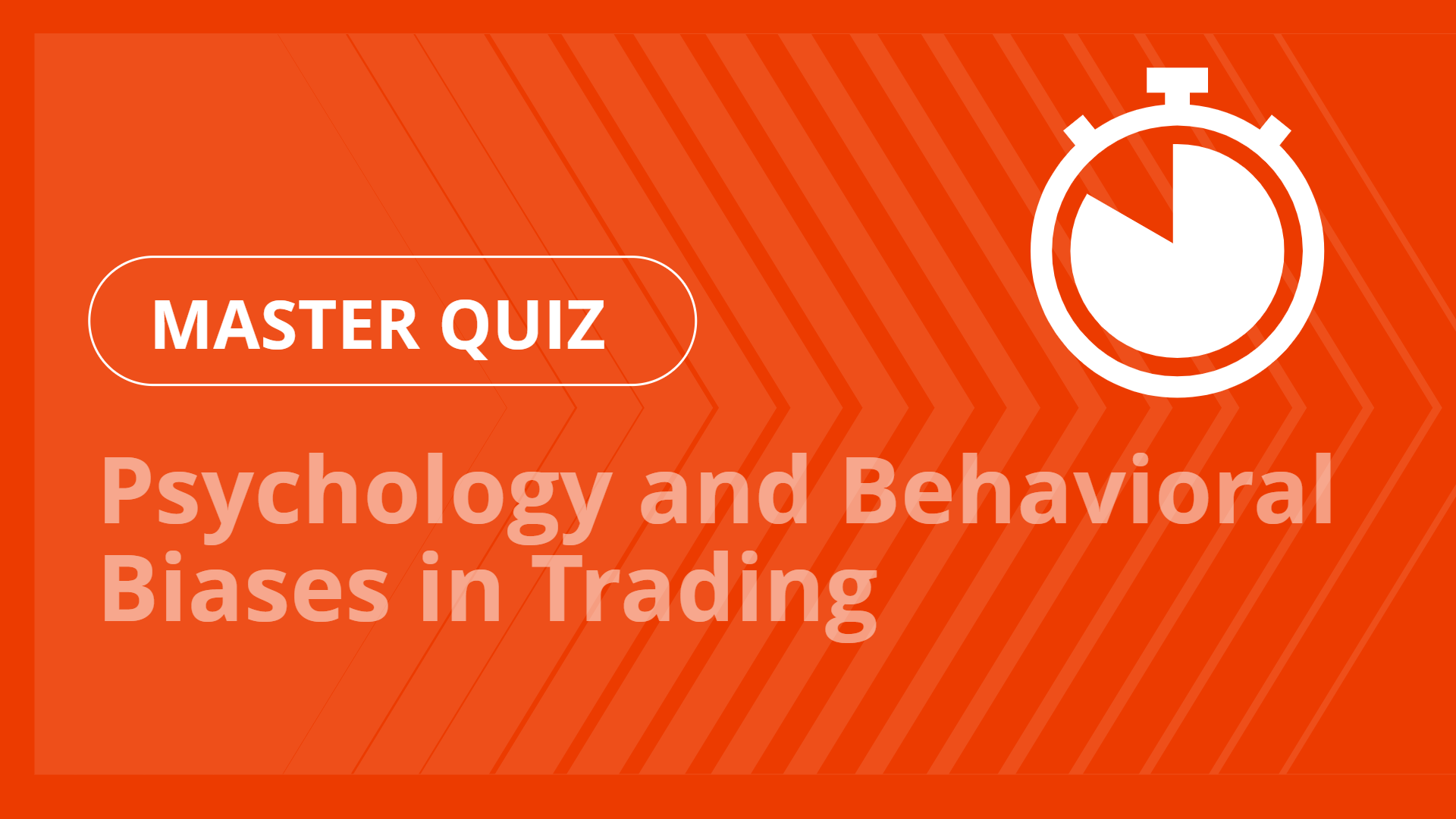Psychology and behavioral biases in trading

This e-learning course "Psychology and behavioral biases in trading" supports you in better mastering this topic in a professional context.
The aim of this course is to help you identify the emotions influencing financial decisions.
The examples, situational exercises, and case studies are designed to be easily transposable into different professional contexts and types of organizations.
Prerequisites
No specific prerequisites are required to follow this course.
Target Audience
Managers, HR managers, and employees concerned with the topic "Psychology and behavioral biases in trading."
Content
The course is structured into several complementary modules, combining theoretical contributions, practical applications, and interactive activities to facilitate the appropriation of concepts.
Training path
 Understanding why our choices mislead us in decision-makingExplore the invisible mechanisms that distort your financial decisionsEven the best traders can fall into the trap of their own emotions.This standalone module, both…
Understanding why our choices mislead us in decision-makingExplore the invisible mechanisms that distort your financial decisionsEven the best traders can fall into the trap of their own emotions.This standalone module, both…Explore the invisible mechanisms that distort your financial decisions
Even the best traders can fall into the trap of their own emotions.
This standalone module, both powerful and accessible, invites you to open your eyes to an often underestimated area: the influence of cognitive biases in your financial decisions.
Why take this module?
Because making a bad decision at the wrong time can be very costly.
This module will help you to:
- Understand the unconscious mechanisms that short-circuit financial logic
- Identify the most common cognitive biases in trading
- Measure the impact of your emotions on your performance
- Become aware of judgment errors... before they cost you too much
Who is this module for?
For traders, finance students, or professionals in management control and purchasing who wish to sharpen their analytical skills, master their stress, and reduce the impact of mental distortions in a fast-paced decision-making context.
Integration into a comprehensive program
This module can be taken independently or integrated into our complete 6-step program:
“Psychology and behavioral biases in trading,” an essential component of our e-learning offering in Finance, Management Control & Purchasing.
A course designed for those who want to make better decisions, even under pressure.
What you will experience
An engaging, clear module, punctuated with concrete examples, to transform your decision-making reflexes and strengthen your mental discipline.
 Understanding cognitive biases to optimize tradingWhy do so many experienced traders still make poor decisions in the financial markets?Because they are human, and therefore subject to cognitive biases and…
Understanding cognitive biases to optimize tradingWhy do so many experienced traders still make poor decisions in the financial markets?Because they are human, and therefore subject to cognitive biases and…Why do so many experienced traders still make poor decisions in the financial markets?
Because they are human, and therefore subject to cognitive biases and emotions that distort their judgment.
This module invites you to dive into the heart of behavioral psychology applied to trading to better understand these invisible... yet powerful mechanisms.
Through this module, you will:
- Explore the main cognitive biases that influence financial decisions (overconfidence, confirmation bias, disposition effect, etc.)
- Discover the underestimated role of emotions such as fear and greed and their impact on logical reasoning in stressful situations
- Understand the basics of behavioral finance and the limitations of traditional economically rational models
- Begin to develop a critical reflexive posture essential for any risk management strategy
This module can be taken independently or integrated into the complete course “Psychology and Behavioral Biases in Trading,” which is part of our professional e-learning offering “Finance, Management Control & Purchasing.”
Fully digital, this content is aimed at market professionals, risk controllers, and students in behavioral finance.
What you will gain from it:
✔ A better understanding of systematic judgment errors in finance
✔ A first level of detection of biases in your own decisions
✔ Practical levers to limit their impact from your next operations
 Mastering decision-making under pressure in a professional environmentAutonomous e-learning module or to be integrated into the complete course “Finance, Management Control & Purchasing”In a financial environment where decisions must be made…
Mastering decision-making under pressure in a professional environmentAutonomous e-learning module or to be integrated into the complete course “Finance, Management Control & Purchasing”In a financial environment where decisions must be made…Autonomous e-learning module or to be integrated into the complete course “Finance, Management Control & Purchasing”
In a financial environment where decisions must be made in real-time, psychological pressure and cognitive biases become your main adversaries. This immersive module offers you strategic training to maintain control even in the most uncertain situations.
What you will experience in this module:
• Interactive simulations based on real trading contexts
• Precise identification of cognitive biases such as the recency effect, confirmation bias, or loss aversion
• Proven techniques to enhance your decision-making objectivity
• Immediately applicable advice to limit the impact of emotions in financial decisions
Why take this module?
Whether you are an experienced trader or a student in behavioral finance, this module will allow you to:
- Reduce costly errors related to judgment biases
- Improve your performance under stress in volatile market conditions
- Develop a mental discipline essential to any professional trading strategy
This module can be taken independently or integrated into the more comprehensive course “Finance, Management Control & Purchasing,” to develop a cross-disciplinary and in-depth expertise on human factors in financial decision-making.
 Adaptive practices for managing cognitive biases in the workplaceSharpen your decision-making under stress and gain clarity in the face of the markets.Are you a trader, finance student, or decision-making expert? This unique…
Adaptive practices for managing cognitive biases in the workplaceSharpen your decision-making under stress and gain clarity in the face of the markets.Are you a trader, finance student, or decision-making expert? This unique…Sharpen your decision-making under stress and gain clarity in the face of the markets.
Are you a trader, finance student, or decision-making expert? This unique module immerses you in realistic situations where emotions, stress, and uncertainty prevail. You will be faced with powerful interactive scenarios, challenged to detect, understand, and overcome the cognitive biases that affect your choices.
This intensely practical module will allow you to:
- Identify the most frequent biases among financial decision-makers
- Experience common emotional reactions in a trading environment
- Choose the most appropriate responses according to profiles and contexts
- Develop your cognitive resilience in the face of real pressures
Through 3 immersive simulations with virtual characters:
• Analyze your thought processes
• Recognize biased decision-making patterns
• Adjust your strategies according to the context
Take it alone or as part of the overall "Finance, Management Control & "Purchases," this module is a powerful tool for any professional or learner who wants to:
→ better manage their emotions
→ strengthen the rationality of their decisions
→ avoid the psychological pitfalls of trading
Develop your reflexes, improve your judgment. Be the informed decision-maker in your financial decisions.
 Master quiz - Psychology and Behavioral Biases in TradingWhether alone or integrated into the e-learning path "Finance, Management Control & Purchasing", this immersive module offers you a fun and stimulating format to…
Master quiz - Psychology and Behavioral Biases in TradingWhether alone or integrated into the e-learning path "Finance, Management Control & Purchasing", this immersive module offers you a fun and stimulating format to…Whether alone or integrated into the e-learning path "Finance, Management Control & Purchasing", this immersive module offers you a fun and stimulating format to test your knowledge on psychology and behavioral biases in trading.
Dive into an interactive experience inspired by the best TV games: you will need to answer correctly to 15 progressively difficult questions on behavioral finance, decision-making under stress, cognitive biases, and much more.
Game format:
- 3 reassuring progression levels: each validated level guarantees that you will not drop below a certain threshold. This encourages you to take your chances… without losing everything.
- 3 strategic jokers to help you overcome the most complex questions: – 50/50: two wrong answers are eliminated – Lifeline: get a valuable hint to guide your thinking – Call an expert: access targeted and contextual advice
Why take this module?
• To consolidate your knowledge in behavioral finance in a motivating format
• To prepare for concrete situations of analysis and decision-making
• To identify your unconscious biases and better anticipate them
• To firmly anchor the learnings of the path through playful pedagogy
This final module can be taken independently for targeted training or integrated into the complete path "Finance, Management Control & Purchasing – Psychology in Trading", to reinforce all the skills acquired in the previous modules.
